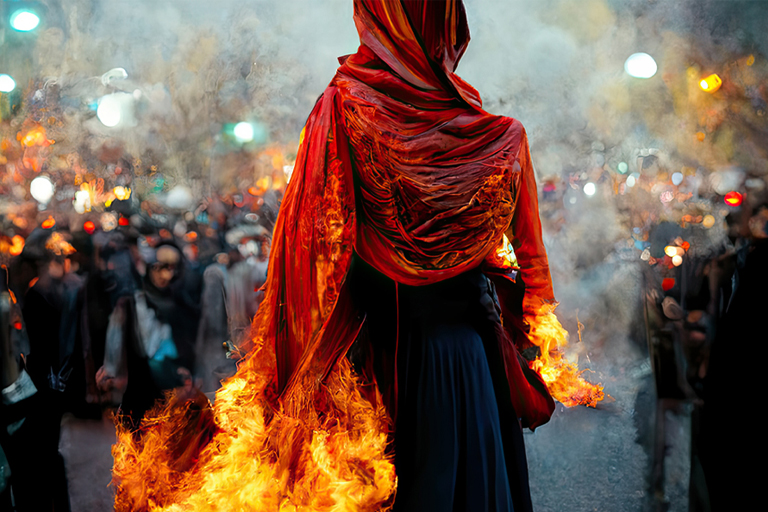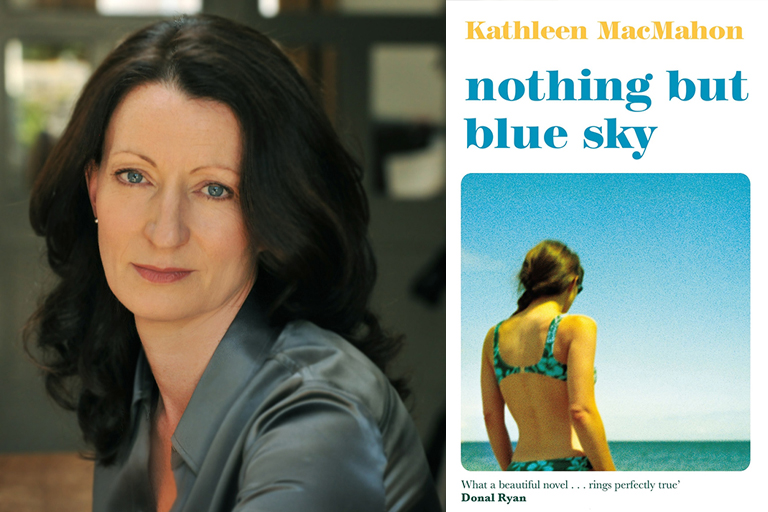Niloufar Tabatabai was shortlisted for the Discoveries Prize in 2020 with her novel-in-progress Say My Name; inspired by her British Iranian background, the novel explores themes of identity and heritage through her narrator Azadeh, growing up as an immigrant and navigating life as a young woman in her twenties.
Here Niloufar writes about the woman-led revolution taking place in Iran, the brave women risking it all to raise their voice for freedom, and shares advice on what we can all do to support the protests.
Woman. Life. Freedom. Zan. Zendegi. Azadi.
These three words express what Iranian women have been protesting about in Iran for the past 12 weeks.
The slogan, taken from the Kurdish slogan Jin. Jian. Azadi’, was adopted by protesters after the death of Mahsa (Jina) Amini on 16 September 2022, a 22-year-old Kurdish woman who was arrested and allegedly beaten to death by Iran’s morality police for wearing her hijab improperly. Her death struck a chord with a nation who for 43 years have been ruled under an oppressive theocracy, where the hijab has been mandatory for women since 1979.
What we are witnessing in Iran could be the first woman-led revolution in the world. Protests have largely been led by Gen Z who are burning their headscarves, cutting their hair and tearing down images of Ayatollah Kahmenei, Iran’s Supreme Leader. The women in Iran are protesting for choice. The freedom to wear whatever they want. They are protesting against a patriarchal regime where only men can divorce their wives. Where girls as young as nine are forced into arranged marriages and men can have four wives. There are so many more disadvantages against women in Iran that I could fill a whole book.
The Iranian government has retaliated against these peaceful protests by using brutal force, limiting internet access, arresting an estimated 17,000 people, and killing at least 440 people, including 60 children and 29 women. Iran’s parliament also recently voted in favour of using the death penalty for protesters.
Iranian women have taken to the streets because we know Mahsa (Jina) could have been one of us. All Iranian women have stories about the morality police. The last time I visited Iran, I was pulled aside for showing too much ankle because there was a small gap between my maxi dress and trainers. My friends have been stopped for a loose hair hanging out their hijab and wearing nail polish. We were lucky we escaped with a telling off or a fine but for others, like Mahsa (Jina), the journey could continue by being bundled up in a van and taken to a ‘correction centre’, where a multitude of unimaginable things could happen behind closed doors. Iranian women have lived with this fear for four decades, but we have had enough. Even writing this article may mean I could be arrested if I go back to Iran. But we no longer have any fear left.
Being a second generation Iranian and part of the diaspora community, I have always found myself having two identities, my Iranian side and my English side. My shortlisted Discoveries Prize 2020 entry Say My Name explores these themes of identity and heritage through the narrator, Azadeh, who is also trying to navigate life in her 20s.
I feel a heavy guilt watching the protests in Iran unfold from my phone screen, because I can’t stand alongside my sisters as they fight this battle on the ground. But I have attended protests every weekend in Trafalgar Square and in a case of life imitating art, this has made me closer to my own culture. A culture that is steeped in history, with the irony not being lost that we are fighting for human rights in the 21st century, yet we were the country to create the first human rights charter in 539 B.C.
In Farsi, we have a phrase Shir-Zan, meaning ‘Lion Woman’. Iranian women fighting for freedom today are Shir-Zans and we have heard them roar.
But they still need our help.
You may think that sharing posts on social media and signing petitions won’t make a difference, but it does. Because of over 1 million signatures on an Amnesty petition, on 24 November 2022, the UN’s Human Rights Council voted overwhelmingly to set up an unprecedented fact-finding investigation into human rights abuses in Iran.
But more needs to be done. Here’s how you can help:
Posting and sharing on social media about what’s happening in Iran, using the hashtags #MahsaAmini #Iranianprotests
Follow these accounts to stay up to date:
Middle East Matters (@middleeastmatters)
Golshifteh Farahani – an Iranian actress and activist (@golfarahani)
Nazanin Boniadi – an Iranian actress & a member of the CHRI board (@nazaninboniadi)
Participate in protests across the UK – in London protests start from 2pm in Trafalgar Square.
Write to your MP to amplify Iranian voices.
Sign a petition about Iran, including:
To maintain sanctions and introduce visa bans on people linked to the Iranian regime: https://petition.parliament.uk/petitions/623572
Change.org petition to free the two female reporters who broke the news of Mahsa Amini https://chng.it/cXsjPLwzmN








